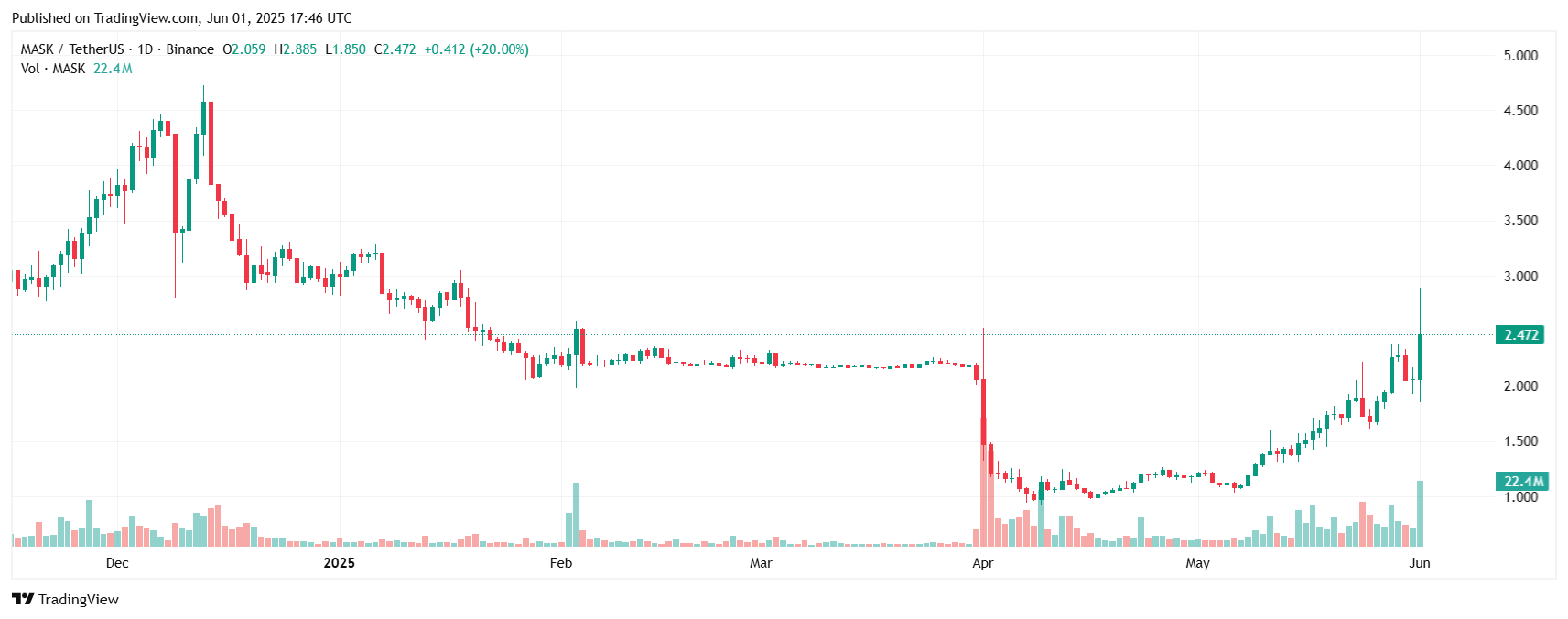In a shocking turn of events, Mask Network founder Suji Yan fell victim to a cryptocurrency theft, losing approximately $4 million worth of digital assets. The incident, which occurred on February 27, 2025, was detected by onchain cybersecurity platform Cyvers and has sent ripples through the crypto community, raising concerns about the security of high-profile figures in the Web 3.0 space.
Details of the Hack
The breach targeted a mobile wallet belonging to Suji Yan, the founder of Mask Network, a platform known for bridging Web 2.0 social media with Web 3.0 functionalities. According to Cointelegraph, the stolen assets included a variety of cryptocurrencies, primarily Ether (ETH)-linked tokens.
The breakdown of the stolen assets is as follows:
|
Asset Type |
Quantity |
Approximate Value (at time of theft) |
|---|---|---|
|
ETH |
113 | $265,000 |
|
WETH |
923 |
Not specified |
|
ezETH |
301 |
Not specified |
|
weETH |
156 |
Not specified |
|
pufET |
90 |
Not specified |
|
MASK |
48,400 |
Not specified |
|
USDT |
50,000 | $50,000 |
|
swETH |
15 |
Not specified |
The hackers swiftly swapped the stolen assets to ETH and dispersed them across six different wallet addresses, one ending in “df7,” a tactic commonly used to obscure the trail of stolen funds. Yan later confirmed that the compromise likely occurred when he left his phone unattended at a private gathering, suggesting a manual attack rather than a sophisticated software exploit.
Impact on Mask Network
The hack had an immediate impact on Mask Network, with the price of its native MASK token dropping by 7% to $2.23 within 24 hours of the incident. This decline reflects the market’s sensitivity to security breaches, particularly in a bearish crypto environment. Yan took to social media to express his shock, stating, “I trust my friends but this is a nightmare to anyone,” highlighting the personal toll of the incident, which coincidentally occurred on his birthday.
Despite the setback, Mask Network remains a significant player in the crypto ecosystem. The platform, which enables users to send encrypted messages, make crypto payments, and interact with decentralized applications (dApps) on platforms like Twitter and Facebook, has a current market cap of $248,184,551, with MASK tokens trading at $2.48 . Since 2022, Mask Network has funded 89 projects with nearly $1 million in grants, supporting Web3 social infrastructure, public goods, and on-chain games.
Mask token pricing moved and reacted to this news. It can be seen in the chart below.

Broader Context of Crypto Security
This incident is part of a troubling wave of high-profile hacks in the crypto space. Just days earlier, on February 21, 2025, Bybit suffered a massive $1.45 billion ETH theft (Cointelegraph), followed by a hack targeting Pump.fun on February 26, 2025. These events underscore the growing sophistication of cybercriminals targeting the Web 3.0 ecosystem.
Meir Dolev, co-founder of Cyvers, emphasized the need for enhanced security measures, stating, “This incident underscores the increasing sophistication of threat actors in the Web3 space and highlights the urgent need for real-time transaction monitoring, preemptive prevention, and rapid incident response”. The repeated targeting of prominent figures and platforms suggests that the crypto industry must prioritize robust security protocols to maintain user trust.
Mask Network’s Role and Resilience
Mask Network has been a pioneer in integrating Web 3.0 functionalities into Web 2.0 platforms, allowing users to access decentralized services without leaving their favorite social media sites. The platform supports features like encrypted messaging, crypto payments, decentralized finance (DeFi), and decentralized storage, creating a seamless bridge between traditional and decentralized internet experiences. Its MASK token serves as both a utility and governance token, enabling holders to vote on ecosystem initiatives through the MaskDAO.
Despite the recent hack, Mask Network’s commitment to innovation remains strong. The platform’s support for decentralized social networks like Bluesky and Mastodon, as well as its plans to build a Web3 dApplet store directly on Web 2.0 platforms, positions it as a leader in the evolving internet landscape. The $5 million investment from DWF Labs in January 2023 further bolstered its efforts to expand the decentralized social network ecosystem.
Looking Ahead
The hack of Suji Yan’s wallet serves as a stark reminder of the vulnerabilities in the crypto space, even for those at the forefront of Web 3.0 innovation. As the crypto community calls for greater transparency and accountability, Mask Network and other projects will likely face increased scrutiny regarding their security practices. The industry must continue to evolve, adopting advanced monitoring and prevention strategies to protect users and maintain confidence in decentralized technologies.
For now, Mask Network remains a key player in the transition to a decentralized internet, but this incident highlights the challenges that lie ahead. Investors and users are urged to stay vigilant and prioritize security in their interactions with digital assets.
Stay informed with daily updates from Blockchain Magazine on Google News. Click here to follow us and mark as favorite: [Blockchain Magazine on Google News].
Disclaimer: Any post shared by a third-party agency are sponsored and Blockchain Magazine has no views on any such posts. The views and opinions expressed in this post are those of the clients and do not necessarily reflect the official policy or position of Blockchain Magazine. The information provided in this post is for informational purposes only and should not be considered as financial, investment, or professional advice. Blockchain Magazine does not endorse or promote any specific products, services, or companies mentioned in this posts. Readers are encouraged to conduct their own research and consult with a qualified professional before making any financial decisions.